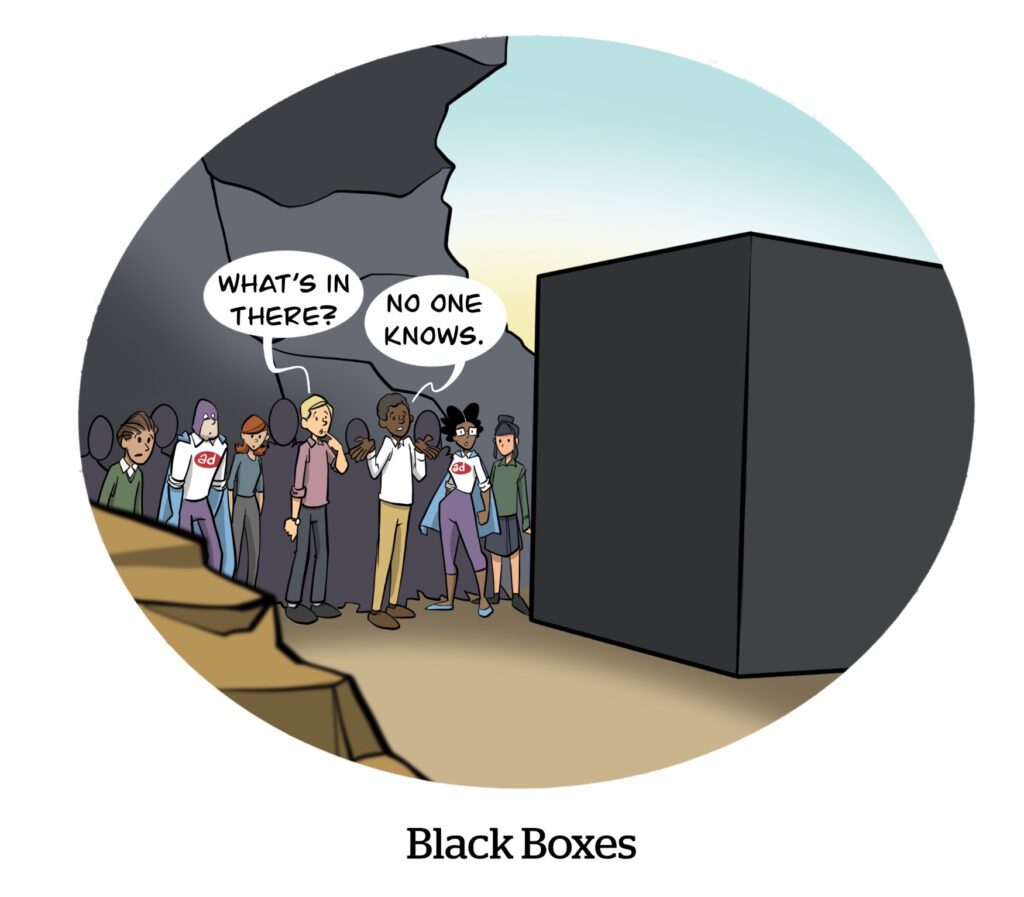Here’s today’s AdExchanger.com news round-up… Want it by email? Sign up here.
Maxed Out
Can the real PMax please stand up?
When Google created Performance Max, it was the first Google product to span all Google Ads inventory through one campaign by default and also use proprietary Google data for targeting and optimization. Meta’s version of this same proposition is called Advantage+ Shopping. Amazon has one, too, which goes by the name “Performance+.” TikTok uses Smart Performance. Even Criteo has Commerce Max.
They’re all cut from the same cloth, but only Microsoft Advertising is cheeky enough to name its version “Performance Max.” (You have to admire Microsoft’s expert trolling and SEO gamesmanship.)
But the pretender versions of PMax are just that: pretenders.
Even Meta’s Advantage+, which is way ahead of the rest of the pack, still only places ads across Facebook, Instagram, WhatsApp and the audience network.
And when other walled garden platforms tout their automated ad products, they’re essentially piggybacking on Google having legitimized – or at least getting advertisers accustomed to – a product that replaces human media buyers with an algorithm.
Despite some misgivings, many advertisers are now in the habit of inputting their creative elements, campaign parameters and goal-based metrics (sales, video views, app downloads, etc.) into the platform – and then allowing the platform to take it from there, thank you very much.
But although these copycats may be following Google’s playbook, most are unlikely to replicate Google’s success, writes Eric Seufert at Mobile Dev Memo. Who else has Google’s scale?
Vive La Autorité?
Google was hit with a 250 million euro fine levied by France’s competition authority for failing to comply with a previous order and processing news and other content to train its Bard AI model without notifying media companies or the regulator. There was no way for publishers to opt out of the program – which they didn’t even know existed.
Google isn’t contesting the fine – just paying and moving on.
As we’ve seen with The New York Times lawsuit against OpenAI, it’s painfully easy to demonstrate AI models plagiarizing content. And as a pre-revenue product, Google Bard perhaps took some license in soaking up the open web to feed its training models.
This fine is part of a broader effort by regulators and legislators to force consumer tech companies to negotiate terms with publishers.
The Autorité de la concurrence (that’s “competition authority” in French) says Google must provide publishers “with the information needed to transparently assess their remuneration for related rights.”
Which implies publishers will be able to demand payment when their content is used to develop an AI model.
The Real Deal?
Beleaguered film and TV studio Paramount Global has been looking for a buyer for some time. On Wednesday, private equity firm Apollo Global Management offered to acquire it for $11 billion, the Wall Street Journal reports.
The offer exceeds Paramount’s market cap of $7.7 billion – yet Paramount might not sell because of board pushback.
This offer is not the only one Paramount, which owns CBS and Nickelodeon, is entertaining. In January, Skydance Media put in a bid to buy National Amusements, Paramount’s parent company, and fold Skydance into Paramount. Paramount has also previously talked about merging with Warner Bros. Discovery, although that’s on ice.
Meanwhile, Paramount has been struggling, as its linear TV business has lost subscribers. It laid off roughly 800 employees – 3% of its workforce – in February. But Paramount+ has been a small bright spot. It added just over 4 million subscribers in Q4, so at least there’s that.
But Wait, There’s More!
The pyramid of user value. [Ad Tech Explained]
The EU’s antitrust chief, Margrethe Vestager, issues a warning to Meta and Apple about their new fee structures, which she says aren’t in the spirit of the newly enacted Digital Markets Act. [Reuters]
How LinkedIn quietly became the talk of the content creator community. [Digiday]
AI search startup Perplexity is challenging Google – while using its data. [The Information]
Users ditch Glassdoor, stunned that the site added real names without consent. [Ars Technica]
Nielsen gives a civil nod to Comscore for attaining MRC accreditation. [LinkedIn]
You’re Hired!
Channel Factory names Kartik Mehta as head of Asia, growth markets. [release]
Microsoft hires Inflection AI Co-Founders Mustafa Suleyman and Karén Simonyan to co-lead a new organization called Microsoft AI focused on Microsoft’s consumer AI products. (Suleyman also co-founded DeepMind.) [blog]











